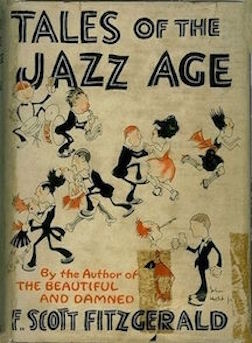
Cover illustration by John Held, 1922. Public domain image
F. Scott Fitzgerald (1896-1940)
A selective list of online literary criticism and analysis for the twentieth-century American novelist and short story writer F. Scott Fitzgerald, favoring signed articles by recognized scholars and articles published in peer-reviewed sources
main page | 20th-century literary criticism | mid-century American fiction | about literaryhistory.com
introduction
Photos and snippets of rare home movies of Scott, Zelda, and Scottie Fitzgerald. Youtube.
"As Big as the Ritz: Scott and Zelda go on inspiring new books," by Adam Gopnik. New Yorker 22 September 2014.
"F. Scott Fitzgerald's Tense, Unhappy Relationship With Hollywood," by Deirdre Clemente. The Atlantic 7 May 2013.
"I'd Die For You Gives A Glimpse Into F. Scott Fitzgerald's Writing Life." On the publication of 18 stories from Fitzgerald's later years, previously unpublished or uncollected. National Public Radio, 30 April 2017.
The Great Gatsby. Selected for "The Big Read," Erika Koss, editor. Inculdes a plot summary, a short biography, and discussion questions. National Endowment for the Arts.
"A brief life of Fitzgerald." A short biography of F. Scott Fitzgerald by Professor Matthew J. Bruccoli.
"F. Scott Fitzgerald." A very short introduction to Fitzgerald. From the educational publisher Heath Anthology of American Literature. Also from Heath, a brief F. Scott Fitzgerald teaching guide, edited by John F. Callahan and John Alberti.
"Fitzgerald's Radiant World," by Thomas Flanagan. The New York Review of Books, 21 December 2000.
F. Scott Fitzgerald Library of America editions.
Daniel, Anne M. "F. Scott Fitzgerald." A substantial introduction to F. Scott Fitzgerald from the Literary Encyclopedia. [The Literary Encyclopedia is a database that provides signed literary criticism by academic experts, and is available to individuals for a reasonably-priced subscription.]
The Great Gatsby (1925) literary criticism
Beuka, Robert. American Icon: Fitzgerald's The Great Gatsby in Critical and Cultural Context (Boydell & Brewer 2011) [jstor book preview].
Callahan, John F. "F. Scott Fitzgerald's Evolving American Dream: The 'Pursuit of Happiness' in The Great Gatsby, Tender is the Night, and The Last Tycoon." Twentieth Century Literature 42, 3 (Autumn 1996) pp 374-95 [free at jstor].
Canterbery, E. Ray "Thorstein Veblen and The Great Gatsby." Canterbery contends that "much of the socioeconomic satire informing The Great Gatsby" reflects the influence of "that earlier adversary of conspicuous consumption and pecuniary emulation, Thorstein Veblen." Journal of Economic Issues 33, 2 (June 1999) pp 297-304 [free at jstor].
Coleman, Dan. "Gatsby and the Dynamics of Dialogue." Style 34, 1 (Spring 2000) [questia subscription ser service].
Johnson, Robert, Jr. "Say It Ain't So, Jay: Fitzgerald's Use of Baseball in The Great Gatsby." The F. Scott Fitzgerald Review 1 (2002), pp. 30-44 [free at jstor].
Kehl, D.G. "Writing the Long Desire: The Function of Sehnsucht in The Great Gatsby and Look Homeward, Angel" [and Thomas Wolfe]. On the mood of longing, homesickness, and nostalgia that is found in much modern American literature. Journal of Modern Literature 24, 2 (Winter 2000/2001) pp 309-19 [free at jstor].
Margolies, Alan "The Maturing of F. Scott Fitzgerald." Twentieth Century Literature 43, 1 (Spring 1997) pp 75-93 [free at jstor].
Murtaugh, Taylor S. "Why We Believe Nick Carraway: Narrative Reliability & American Identity in The Great Gatsby". Trinity College Digital Repository, Hartford, CT.
Pekarofski, Michael. "The Passing of Jay Gatsby: Class and Anti-Semitism in Fitzgerald's 1920s America." Nativism, religious bigotry, and anti-immigrant sentiments in the South, Mid-West, and East Coast US in the 1920sThe F. Scott Fitzgerald Review 10 (2012), pp. 52-72 [free at jstor].
Will, Barbara. "The Great Gatsby and the Obscene Word." College Literature32, 4 (Fall 2005) pp 125-44 [jstor preview or purchase].
other works
Antolin, Pascale. New York in The Beautiful and Damned: 'A City of Words.'" The F. Scott Fitzgerald Review 7 (2009), pp. 113-125 [free at jstor].
Berman, Ronald. Modernity and Progress: Fitzgerald, Hemingway, Orwell (U of Alabama P 2005) [complete book at questia subscription service].
Berryman, John. "F. Scott Fitzgerald." A major poet evaluates Fitzgerald's achievement, in 1946. The Kenyon Review 8, No. 1 (Winter, 1946), pp. 103-112 [free at jstor].
Bruccoli, Matthew J. The Far Side of Paradise: A Biography of F. Scott Fitzgerald. A review of Bruccoli's major biography, by Linda W. Wagner. American Literature 54, 2 (May, 1982), pp. 304-306 [free at jstor].
Donaldson, Scott. "Scott Fitzgerald's Romance with the South." On the contrasting values of North and South in Fitzgerald's stories. The Southern Literary Journal 5, 2 (Spring 1973) pp 3-17 [free at jstor].
Jolliff, William G. "The Damnation of Bryan Dalyrimple-and Theron Ware: F. Scott Fitzgerald's Debt to Harold Frederic." On Fitzgerald's debt to late nineteenth century American naturalists. Studies in Short Fiction 35, 1 (Winter 1998) [questia subscription service].
Kazin, Alfred, ed. F. Scott Fitzgerald: The Man and His Work (1951) [complete book at questia].
Mizener, Arthur. Some Sort of Epic Grandeur: The Life of F. Scott Fitzgerald. A review of Mizener's trailblazing biography, by John T. Flanagan. Minnesota History 32, 2 (June 1951), pp. 115-117 [free at jstor].
Nowlin, Michael. "'The World's Rarest Work': Modernism and Masculinity in Fitzgerald's Tender is the Night." College Literature 25, 2 (Spring 1998) pp 58-77 [jstor preview or purchase].
Prigozy, Ruth. "'Poor Butterfly': F. Scott Fitzgerald and Popular Music." On Fitzgerald's interest in the music of his time. Prospects 2 (Oct. 1977) pp 41-67 [abstract or purchase from Cambridge UP].
Ullrich, David W. "Memorials and Monuments: Historical Method and the Construction of Memory in F. Scott Fitzgerald's 'The Ice Palace.'" Studies in Short Fiction 36, 4 (Fall 1999) [questia].
main page | 20th-century literary criticism | mid-century American fiction | about literaryhistory.com
1998-2018 by Jan Pridmore
